Cheap Japanese Houses for Sale A Complete Guide
Discover cheap Japanese houses for sale. Our guide covers finding, buying, and renovating akiya properties. Start your journey to owning a home in Japan.
Posted by
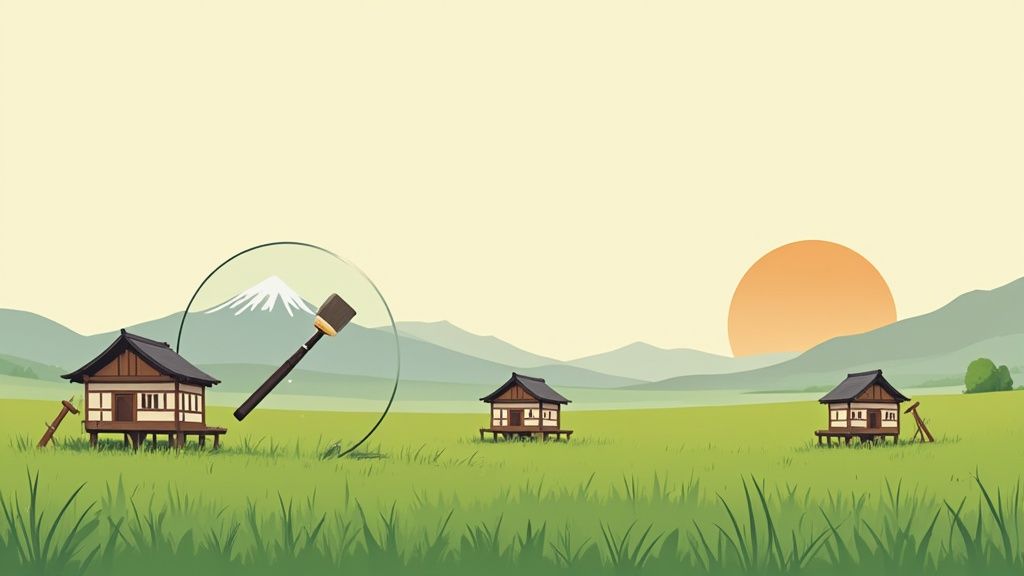
It's true—you really can find houses in Japan for sale for less than the price of a second-hand car. These properties are often called akiya, or vacant homes, and they've become surprisingly common due to Japan's unique demographic shifts. For anyone dreaming of owning a home in Japan, this has created a truly remarkable opportunity.
Why Are There So Many Cheap Houses in Japan?
Finding an affordable home in Japan isn't about stumbling upon a rare, hidden deal. It’s about understanding a nationwide phenomenon. Imagine the Japanese countryside as a vast antique shop, full of forgotten but solid treasures. Decades of population decline and a steady migration to big cities have left millions of perfectly good houses empty, creating a buyer's market unlike almost anywhere else on the planet.
A major driver behind this is Japan’s aging population, a situation often referred to as the '2025 Problem.' As the baby boomer generation gets older, more homes become vacant when owners pass away or move into care facilities. This has led to a massive surplus of available properties. For a deep dive into this topic, you can read more about Japan’s unique demographic challenges on nippontradings.com. The bottom line? You could own a piece of Japan for a fraction of what you'd pay in most other developed countries.
Understanding the Akiya Phenomenon
The word you'll constantly come across is "akiya" (空き家), which simply translates to "vacant house." Don't let the term fool you; these aren't all dilapidated ruins. Many are well-built homes that were simply left behind for a mix of reasons:
- Demographic Shifts: For decades, younger generations have flocked to cities like Tokyo and Osaka for work, leaving their rural family homes empty.
- Inheritance Hurdles: Japan's inheritance laws can be complex, and the potential tax burdens sometimes make it easier for heirs to just walk away from a property rather than deal with selling or maintaining it.
- Cultural Preferences: There's a strong cultural preference for new construction in Japan. This means that older homes, even if they're in great shape, tend to lose their value very quickly.
This blend of factors has created a one-of-a-kind opportunity. For people looking to buy, especially from overseas, the dream of owning a home in Japan is suddenly within reach. These cheap Japanese houses are more than just buildings; they're gateways to a different way of life and a chance to truly connect with local communities.
To make sense of it all, it helps to see the main forces at play.
Key Factors Driving Japan's Affordable Housing Market
The availability of these affordable homes isn't a fluke; it's the result of several long-term social and economic trends converging. This table breaks down the primary reasons these properties exist and what that means for you as a potential buyer.
| Driving Factor | Impact on Housing Market | Opportunity for Buyers |
|---|---|---|
| Aging Population | A massive surplus of inherited and vacant homes, especially in rural areas. | An abundance of extremely low-cost properties, often sold for symbolic prices. |
| Urban Migration | Depopulation of countryside towns leads to a decline in local demand for housing. | The ability to purchase larger homes with land for significantly less than in urban centers. |
| Cultural Value | Strong preference for new builds causes older homes to depreciate rapidly. | Well-maintained older homes become available for a fraction of their original construction cost. |
Ultimately, these factors combine to create a market where the supply of older homes far outstrips the local demand, opening the door for buyers who see the value and potential that others have overlooked.
Understanding the Japanese Property Market
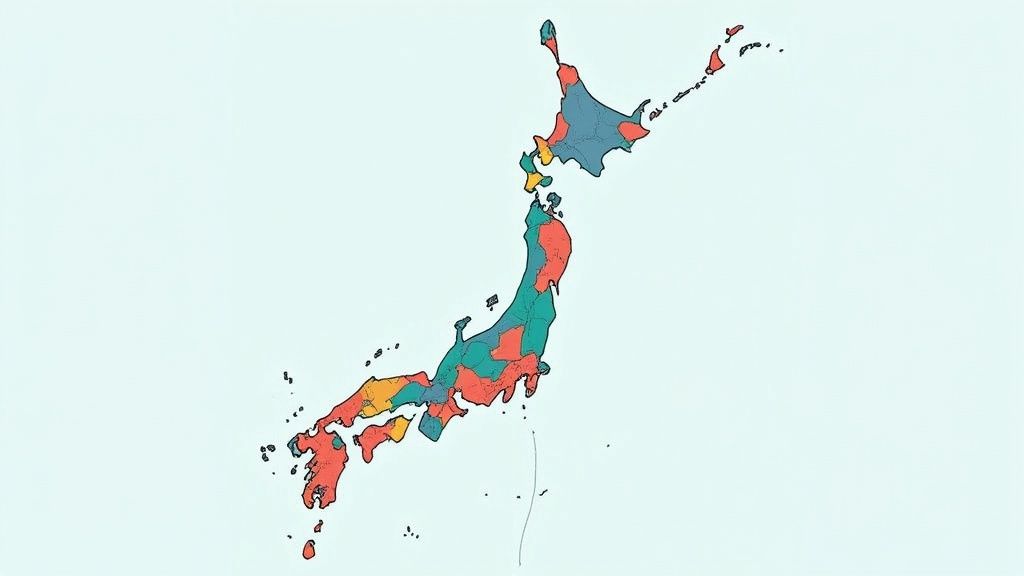 To really wrap your head around the idea of cheap Japanese houses for sale, you have to look past the sticker price. The market has its own unique quirks, and the biggest one is the sheer number of akiya (空き家)—vacant houses. These properties are the heart of the affordable housing scene in Japan.
To really wrap your head around the idea of cheap Japanese houses for sale, you have to look past the sticker price. The market has its own unique quirks, and the biggest one is the sheer number of akiya (空き家)—vacant houses. These properties are the heart of the affordable housing scene in Japan.
Think of an akiya less like an empty building and more like a time capsule. Many are sold completely "as-is," which often means the previous owner’s furniture, dishes, and personal items are still right where they left them. Heirs might live on the other side of the country, and the emotional or logistical burden of clearing out a family home is just too much.
For a buyer, it’s a fascinating, and sometimes poignant, peek into someone else's life. But more importantly, it shows you’re buying a story, not just a structure. This is a far cry from the professionally staged, empty homes you typically see in Western real estate.
The Allure and Reality of Akiya
So, why are these homes so cheap? It all comes down to a mix of Japanese cultural preferences and major demographic shifts. Unlike many Western countries where old homes are cherished, Japan has a deep-seated preference for new construction.
This means a building's value plummets over time. In fact, many houses are considered almost worthless after just 20-30 years, leaving only the land with any real value. Combine that rapid depreciation with a shrinking population, and you have a massive oversupply of older homes. This is what pushes prices to rock-bottom levels, creating a goldmine for buyers who can see potential where others just see old wood.
Of course, that low price usually comes with a catch. Many of these properties need a lot of work, from simple cosmetic fixes to major structural overhauls. Getting your head around this trade-off is the first real step to making a smart investment.
"Many 'free' or very cheap homes are often more trouble than they are worth. They can suffer from structural problems, fail to meet crucial earthquake resistance standards, and may demand hefty renovation costs before they’re even livable."
This is a critical reality check. That initial purchase price is just the entry ticket. A professional inspection is an absolute must to uncover hidden problems with the foundation, roof, or plumbing before you commit.
Beyond Akiya Other Affordable Options
While akiya grab all the headlines, they aren't your only option for affordable housing in Japan. Depending on what you’re looking for, other types of properties might be a much better fit.
- Older Suburban Apartments: On the outskirts of big cities, you can find older, smaller apartments (often called "mansions" in Japan) for very reasonable prices. They’re typically in concrete buildings and are a great low-maintenance alternative to a freestanding house.
- Small Townhouses: In smaller cities and towns, you can find traditional townhouses or "machiya." They often need renovation but give you a central location and a genuine connection to the local community.
- "Komi" Properties: These are properties with strings attached—think messy property lines, difficult road access, or other legal quirks. These complications drive the price way down, but they require a lot of extra research. For the right buyer, they can be an incredible bargain.
Each path offers a different lifestyle. A rural akiya gives you space and quiet, while a suburban apartment offers convenience. To get a feel for how prices vary from region to region, our comprehensive guide on Japan housing prices can give you the context you need. Ultimately, the right choice comes down to your budget, your stomach for renovations, and the kind of life you want to build in Japan.
How to Find Affordable Homes Across Japan
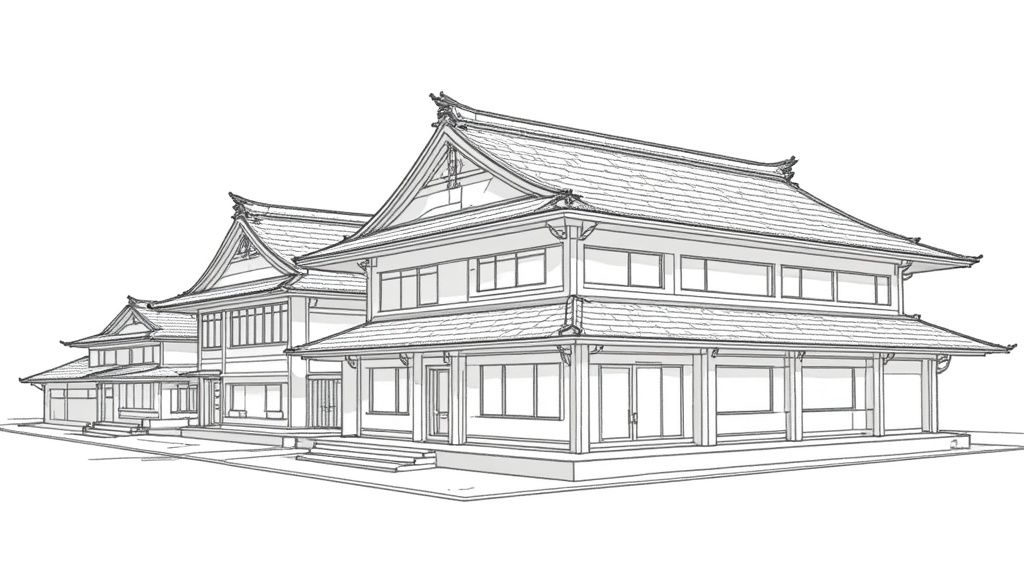
Alright, you get the "what" and the "why" of Japan's affordable housing market. Now for the fun part: the "how." Finding these homes isn't your typical real estate search. It's an adventure that requires knowing exactly where to look and what tools to use.
Your hunt for cheap Japanese houses for sale will almost certainly lead you away from Tokyo's bright lights and into the country's stunning landscapes. You’ll find great opportunities in places like Chiba, which offers a perfect mix of rural quiet and easy access to the capital. The coastal towns dotted around the Seto Inland Sea are another goldmine for affordable properties, many with incredible ocean views.
This isn't about scrolling through mainstream property sites. It's more of a treasure hunt, and you need the right map.
Tapping into Akiya Banks
The single most important tool in your search is the akiya bank (空き家バンク). These aren't banks in the financial sense; they are online databases, usually run by local town or city governments, that list all the vacant homes in their jurisdiction.
Think of it like a community bulletin board where empty homes are posted to attract new owners. Akiya banks are the government's primary tool for fighting rural depopulation, making it easier for people like you to discover and buy these properties.
Be prepared for a bit of a challenge, though. Most of these sites are entirely in Japanese, and the quality varies a lot—some are just simple PDF lists, while others are full-blown property portals. They’re a fantastic place to start, but you’ll need patience and a good translation tool.
It's crucial to remember that the local government isn't a real estate agent. They're just a matchmaker connecting you to the property owner. You’re still on the hook for handling the legal side of the purchase, which is why getting professional help is non-negotiable.
Using Specialized Real Estate Websites
Beyond the official government portals, a new wave of websites has popped up to cater specifically to people hunting for cheap Japanese homes. These sites do the legwork for you, pulling listings from various akiya banks and presenting them in a much more user-friendly format—often in English.
These platforms are a huge time-saver. Instead of digging through dozens of municipal websites, you can get a bird's-eye view of what’s available across the country from one place.
You’ll generally find a few different types of sites:
- National Akiya Databases: Big Japanese real estate portals like Lifull Homes have entire sections dedicated to akiya, with powerful search tools to filter by prefecture.
- English-Language Curated Sites: A handful of services are built for foreign buyers, offering hand-picked lists of promising properties and English-speaking support.
- "Free House" Platforms: Websites like Zero Estate focus on properties being given away for free. As we've discussed, "free" rarely means zero cost, but they can be a source of unique opportunities.
The scale here is massive. By the mid-2020s, official records showed that over 10% of Japan's entire housing stock was vacant—that's more than 8 million homes. The vast majority are in rural areas, with prices sometimes dipping below 1 million yen (around $7,000). Many local governments sweeten the deal with renovation subsidies to help revitalize their communities. You can learn more about Japan's vacant home phenomenon on landhousing.co.jp.
The Role of Local Real Estate Agents
Online tools are great, but they can't replace a real person on the ground. A local, bilingual real estate agent will be your most valuable asset on this journey.
An agent is your guide, negotiator, and cultural translator all in one. They can talk to owners on your behalf, give you the real story on a property's condition, and connect you with essential professionals like a judicial scrivener. Best of all, they often have access to "pocket listings"—properties that never even get advertised publicly.
Finding the right agent can make or break your experience. Look for someone who openly mentions their experience with akiya and foreign buyers. Their local knowledge is pure gold, especially when it comes to navigating regional rules and fitting into the community. For more tips on starting your search, check out our guide on how to find a cheap home in Japan.
Navigating the Purchase Process as a Foreign Buyer
The thought of buying one of the many cheap Japanese houses for sale is exciting, but let's be honest—from the outside, the process can feel like a total mystery. The good news is that Japan doesn't have any legal restrictions stopping foreigners from owning property. The real hurdles are practical ones: the language barrier, navigating the paperwork, and sorting out the money.
Think of it like this: you wouldn't climb Mt. Fuji without a seasoned guide, and you shouldn't try to buy a house in Japan without the right local experts on your team. This means finding a bilingual real estate agent and, most importantly, a judicial scrivener, known as a shihō shoshi. They're the ones who make sure everything is done by the book.
This infographic lays out the entire journey, breaking it down into three main stages.
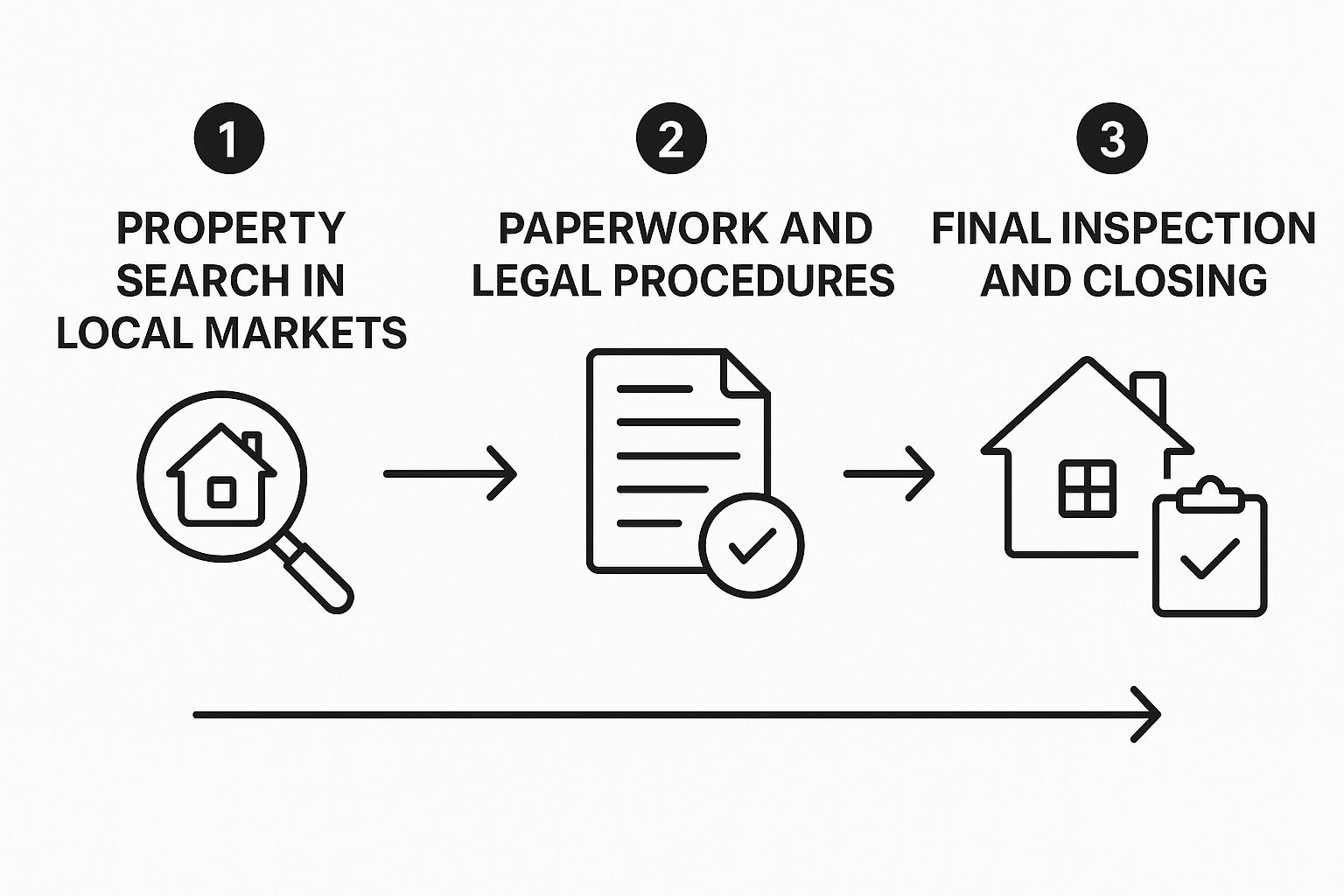
As you can see, it’s a logical flow from finding a place to verifying the legal details and, finally, closing the deal. It also highlights just how critical professional help is at each step.
Your Essential Legal Guide: The Judicial Scrivener
While your real estate agent is out there hunting for properties, the judicial scrivener is the legal pro who makes sure the transaction is legitimate and properly recorded. Their role is absolutely non-negotiable, especially when you're dealing with older homes or akiya.
A scrivener is responsible for a few vital tasks:
- Title Verification: They dig into the property’s legal history to confirm the seller is the real owner and that there are no hidden liens or debts attached to it.
- Inheritance Issues: Many akiya come with complicated ownership histories. Sometimes, a house might have several heirs who need to be found and convinced to sign off. The scrivener handles this messy process to clear the title for the sale.
- Registration: Once the sale is a done deal, the scrivener files all the official paperwork with the Legal Affairs Bureau to legally transfer the property title into your name.
One of the biggest traps for foreign buyers is underestimating just how messy ownership can get. It's not uncommon to find a property still registered in the name of a long-deceased owner. A judicial scrivener is the only person qualified to untangle these inheritance webs and ensure you walk away with a clean, undisputed title.
Financing Your Japanese Home
For most foreigners, getting a mortgage from a Japanese bank for a cheap, rural property is a long shot. Banks almost always require permanent residency, a Japanese spouse, or a solid, long-term employment history in Japan. They get especially nervous about lending for low-value rural homes, which they see as depreciating assets.
Because of this, the vast majority of foreigners who buy cheap Japanese houses for sale pay with cash. It simplifies the entire process enormously, cutting out the need for bank approvals and endless financial checks. If you're serious about buying, having your funds ready to go is by far the most straightforward path.
For those dead set on getting a loan, some smaller, regional banks might be a bit more flexible, but that's definitely the exception, not the rule.
Key Documents and The Closing Process
Once you've got your money and your legal team lined up, the final steps are pretty straightforward but demand a lot of precision. You'll need a few key documents to get the deal done.
- Affidavit of Identity: Since you probably don't have a Japanese residence certificate (jūminhyō), you'll need an affidavit from your home country's embassy in Japan. This document simply confirms your name and home address officially.
- Personal Seal (Optional but Recommended): While not always mandatory for foreigners, getting a registered personal seal (inkan) can make signing documents a whole lot smoother.
- Proof of Funds: You’ll have to show that you have the cash on hand to cover the purchase price and all the associated fees.
The final step is the closing meeting, which almost always happens at the seller's bank. You, the seller, your agent, and the judicial scrivener will all get together. You'll transfer the payment, and the scrivener will collect the final signed documents to go register your ownership.
For a more detailed breakdown of the legal steps, you can learn more about how to buy property in Japan in our complete guide. After that, congratulations—the house is yours
Budgeting Beyond the Purchase Price
That unbelievably low price tag you see on many cheap Japanese houses for sale is just the beginning of the financial picture. It's incredibly exciting, but thinking that's all you'll pay is like buying a car and forgetting you need to budget for insurance, gas, and oil changes.
To avoid any nasty surprises down the road, you have to look past the sticker price and build a realistic budget. These extra costs aren't just minor details; they’re a fundamental part of the deal. Getting this right is the difference between your dream home and a financial headache.
Uncovering the Hidden Costs
The moment you agree to buy a property in Japan, a series of one-time fees and taxes kick in. These are standard transactional costs that pop up with almost every purchase, no matter how cheap the house itself is.
First, you've got taxes. A Registration and License Tax is required to officially put the property title in your name. Shortly after, you'll get a bill for a one-time Property Acquisition Tax. Critically, this is calculated on the property's assessed value, not what you actually paid for it.
Then come the professional fees. You'll need to pay your real estate agent's commission, which is typically 3% of the purchase price plus 60,000 JPY. You also have to pay a judicial scrivener to handle all the legal paperwork and make sure the transfer is done correctly. All in, you should plan for these upfront costs to add an extra 6-8% on top of the property's price.
Long-Term Financial Commitments
Once the keys are in your hand, your financial obligations shift from one-off payments to recurring costs. These are the realities of homeownership that stick with you for as long as you have the property.
Every single year, you can expect to pay two main property taxes:
- Fixed Asset Tax (固定資産税, koteishisanzei): This is the main annual property tax that goes to the local municipality.
- City Planning Tax (都市計画税, toshi keikakuzei): Often bundled with the fixed asset tax, this applies to homes located within designated urban planning areas.
Renovation is the other huge variable. That charming old wooden akiya might be a steal, but it could easily need a new roof, modern plumbing, or proper insulation. These are not small jobs, and the costs can quickly dwarf the original purchase price. A ¥1,000,000 house can easily become a ¥5,000,000 project. This is why a professional inspection is non-negotiable—it helps you estimate these potential costs before you commit.
A fantastic silver lining is that many local governments offer renovation subsidies to encourage people to fix up akiya. These programs can seriously cut your costs, but they usually come with strings attached, like requiring you to live there for a certain number of years. Digging into these local grants is a crucial part of smart budgeting.
Cost Comparison: Urban Apartment vs. Rural Akiya
To really see how this plays out, let's compare the potential costs for two different kinds of affordable properties. The table below gives a rough idea of how the numbers can stack up, even when the initial prices seem worlds apart.
| Cost Category | Small Urban Apartment (Example) | Rural Akiya (Example) |
|---|---|---|
| Purchase Price | ¥5,000,000 ($33,000) | ¥1,500,000 ($10,000) |
| Initial Fees & Taxes | ~¥400,000 ($2,600) | ~¥150,000 ($1,000) |
| Immediate Renovations | Minimal (e.g., paint, fixtures) | Significant (e.g., roof, kitchen) |
| Annual Property Tax | Higher due to urban location | Lower due to rural location |
| Ongoing Maintenance | Lower (shared building costs) | Higher (full responsibility) |
| Potential Subsidies | Unlikely | Very likely for renovations |
As you can see, the rural akiya has a much lower barrier to entry, but the potential renovation and maintenance costs could be much higher over time. Your best choice really depends on your total budget, your timeline, and how much of a project you're ready to take on.
Bringing Your Japanese Dream Home to Life
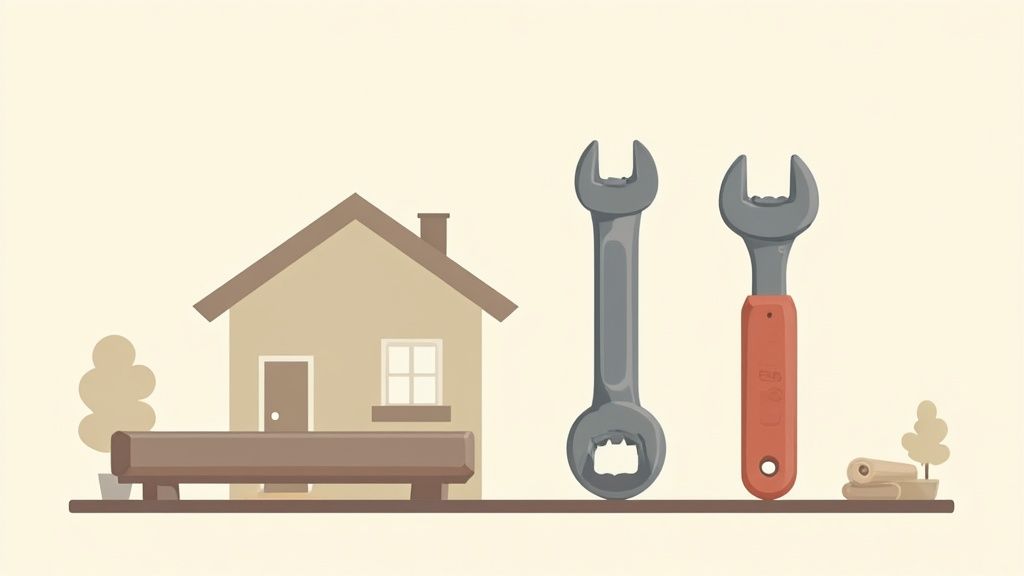
Once the ink is dry and the keys are in your hand, the real fun begins. This is your chance to breathe new life into a forgotten building, transforming it into a home, a business, or a quiet retreat. The stories I've heard are incredible—buyers turning old farmhouses into thriving guesthouses, converting dusty shops into charming cafes, or just crafting a beautiful, modern home for their family.
This is the phase where you get to bring that initial vision to life. Maybe you pictured a sleek, minimalist interior tucked inside a traditional wooden frame, or perhaps you're planning a full-blown restoration to celebrate the home's original character. Whatever your dream, this is where the property truly becomes yours.
It’s a world away from the property scene in Japan's big cities. While you're mapping out a budget-friendly renovation in the countryside, Tokyo's housing price index jumped 8.14% year-on-year at the start of 2025, with luxury condos breaking sales records. This just goes to show what a unique opportunity these cheap houses offer: a chance to create real value on your own terms, far from the overheated urban markets. You can dig deeper into Japan's prime real estate market trends on tokyoportfolio.com.
To DIY or Hire a Professional?
Your first big decision is a classic one: roll up your sleeves and do it yourself, or call in the pros? The right answer really depends on the scale of the job, your own skill set, and the house's overall condition.
- DIY Projects: This route is perfect for cosmetic touches. Think painting, sanding down old floorboards, replacing torn shoji paper screens, and other minor fixes. If you’ve got the skills and the time, it’s a wonderful way to save money and really connect with your new home.
- Professional Help: Don't hesitate to hire experts for anything structural, electrical, or plumbing-related. Japanese building codes are no joke, especially when it comes to earthquake-proofing, and this kind of work demands licensed professionals.
A common pitfall I see is underestimating the complexity of traditional Japanese carpentry or modern seismic retrofitting. For any work that touches the home's safety or structural integrity, hiring a local contractor isn't just a good idea—it's a must.
Finding Local Contractors and Respecting Tradition
Finding a trustworthy local contractor, or daiku, is absolutely key to your project's success. Your real estate agent is a great starting point, but don't be afraid to ask your new neighbors for recommendations. A good daiku will not only be skilled in modern building practices but will also understand and respect the traditional construction methods that make these old homes so special.
They'll be your guide through critical decisions, like:
- Earthquake Proofing: They can walk you through the options for seismic retrofitting (taishin hokyo) to bring the building up to today's safety standards.
- Blending Styles: They'll help you strike the perfect balance between preserving traditional features like exposed wooden beams and adding modern comforts like proper insulation or double-glazed windows.
- Sourcing Materials: A local pro will know where to find authentic materials for repairs while helping you integrate contemporary fixtures where it makes sense.
Working with local artisans is about more than just getting the job done. It’s about ensuring your renovation honors the home’s history while creating a safe, comfortable, and beautiful space for your new chapter in Japan.
Your Top Questions About Buying a House in Japan, Answered
Jumping into the world of affordable Japanese real estate is exciting, but it definitely brings up a lot of questions. From your legal rights as a foreigner to those sneaky hidden costs, getting straight answers is the first step to making a smart decision.
Let's walk through some of the most common things people wonder about. My goal here is to clear up the confusion and give you the confidence to move forward.
Can a Foreigner Actually Buy Property in Japan?
Yes, you absolutely can. This is probably the biggest and most welcome surprise for most people. Japan places no legal restrictions on foreigners owning land or property.
It doesn't matter if you're here on a tourist visa or you're a long-term resident—your passport doesn't lock you out of the market. Legally, you have the same property rights as any Japanese citizen.
The real hurdles aren't legal; they're practical. You'll have to navigate a process that's almost entirely in Japanese, find a real estate agent you can communicate with, and figure out the financing, which is often the toughest part for non-residents.
What Are the Biggest Hidden Costs I Should Brace For?
That unbelievably low price tag on an akiya? Think of it as a down payment, not the final number. The most significant costs that pop up later are almost always for renovations. An old countryside house might look charming, but it could be hiding a leaky roof, ancient plumbing, or the need for a seismic retrofit to bring it up to modern earthquake standards. These fixes can easily cost more than the house itself.
Beyond repairs, you need to budget for a few other things:
- Annual Property Taxes: This is a recurring expense based on your property's official assessed value.
- Agent and Legal Fees: Count on about 3% for the real estate agent, plus separate fees for the judicial scrivener who handles the legal paperwork.
- One-Time Acquisition Tax: A few months after you buy, you'll get a bill from the local prefecture for this one-off tax.
The golden rule is to get a professional inspection before you sign anything. It's the only way to get a realistic picture of what you're truly getting into.
Can I Get a Mortgage as a Foreigner?
For a cheap rural property, this is a long shot. It’s incredibly difficult.
Most major Japanese banks won't even look at a loan application unless you have permanent residency, are married to a Japanese national, or have a very stable, long-term job with a Japanese company. They’re especially wary of lending for low-value akiya because, frankly, they don't see them as a great investment with high resale value.
This is exactly why the vast majority of foreigners who buy these cheap Japanese houses do so with cash. Paying outright sidesteps the biggest obstacle in the entire process and makes the transaction smooth and simple.
Will Buying a House Get Me a Visa?
In a word: no. Owning property in Japan has absolutely zero impact on your visa or residency status. You can't get a visa just by buying a house.
You have to qualify to live in Japan on your own merits, whether that's through a work visa, a student visa, or by marrying a Japanese citizen. A home is a wonderful part of the life you can build here, but it doesn't give you the legal ticket to stay.
Ready to start your search? With interactive maps and over 100,000 listings, mapdomo is your gateway to finding the perfect property in Japan. Explore our constantly updated database to discover everything from modern city apartments to traditional countryside akiyas. Begin your Japanese home-buying journey with mapdomo today.